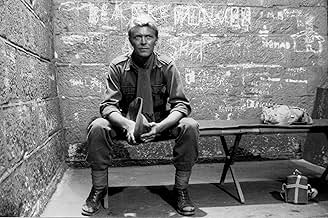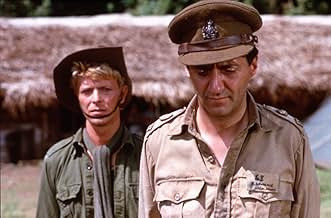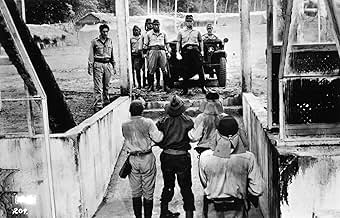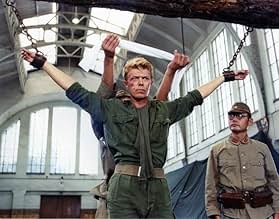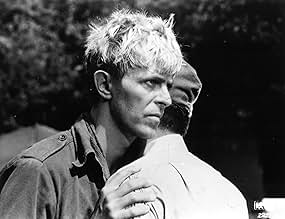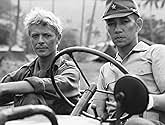IMDb RATING
7.2/10
22K
YOUR RATING
During WWII, a British colonel tries to bridge the cultural divides between a British POW and the Japanese camp commander in order to avoid bloodshed.During WWII, a British colonel tries to bridge the cultural divides between a British POW and the Japanese camp commander in order to avoid bloodshed.During WWII, a British colonel tries to bridge the cultural divides between a British POW and the Japanese camp commander in order to avoid bloodshed.
- Director
- Writers
- Stars
- Won 1 BAFTA Award
- 10 wins & 8 nominations total
Takeshi Kitano
- Hara
- (as Takeshi)
Johnny Ôkura
- Kanemoto
- (as Johnny Ohkura)
Yûya Uchida
- Commandant of Military Prison
- (as Yuya Uchida)
Ryûnosuke Kaneda
- President of the Court
- (as Ryunosuke Kaneda)
Takashi Naitô
- Lieutenant Iwata
- (as Takashi Naito)
Rokkô Toura
- Interpreter
- (as Rokko Toura)
Yûji Honma
- PFC Yajima
- (as Yuji Honma)
- Director
- Writers
- All cast & crew
- Production, box office & more at IMDbPro
Featured reviews
Do not mistake this masterpiece for a Capra Christmas movie. It is a war film without action (but with atrocities) that opens your eyes and is incredibly versatile and therefore applicable to any war that knows a winner and a loser.
The story is completely about perspectives and motives: power-madness and despair. Some might find MCML hard to stomach while watching, some afterwards. But I say you have to watch it through to appreciate the concepts fully. Moreover, I say you shouldn't vote it before you've seen all of it; that way the rating wouldn't be as low as 6.9. MCML is one of those films that surpass movies like 'Platoon' (Stone, 1986) on any level. Added to all that, it's also beautifully shot by cinematographer Toichiro Naroshima (Double Suicide).
One of the best scores in history of cinema by Ryuichi Sakamoto (also 'Wild Palms' and 'Sheltering Sky'), who not only provides it with his strokes of musical genius, but also plays an important role: the androgynous and curious captain in contrast to the virility of Takeshi Kitano (dir and acted Violent Cop, Brother, Hana Bi) the self-confident and straight-forward sergeant. If you've seen any of Kitano's movies, his character in MCML will gain from that. I guess director Nagisa Oshima (Naked Youth, Gohatto) likes to play with feminine and masculine characters. David Bowie fits in brilliantly from that perspective. His character is the most complex and worked out the deepest. My opinion is that this is his best and most intriguing role so far ('the Man who fell to earth' came close). Conti ('If we'll do it, he'll do it') plays a key figure between the Japanese and the POW.
On which side to lose a war? When to intimidate and when to be intimidated?
Which side are you on anyway? 'There are times victory is very hard to take' - Colonel John Lawrence. Not without reason sergeant Gengo Hara says 'Merry Christmas Mr. Lawrence' not: 'Merry Christmas Colonel Lawrence'. Are you intimidated by an initiation? Or still not when you're POW and the only free part of your body is your head? These are questions the film raises. Unfortunately I can't compare the film to the book, because I haven't read it. MCML is immensely powerful, and really underrated. 10/10
The story is completely about perspectives and motives: power-madness and despair. Some might find MCML hard to stomach while watching, some afterwards. But I say you have to watch it through to appreciate the concepts fully. Moreover, I say you shouldn't vote it before you've seen all of it; that way the rating wouldn't be as low as 6.9. MCML is one of those films that surpass movies like 'Platoon' (Stone, 1986) on any level. Added to all that, it's also beautifully shot by cinematographer Toichiro Naroshima (Double Suicide).
One of the best scores in history of cinema by Ryuichi Sakamoto (also 'Wild Palms' and 'Sheltering Sky'), who not only provides it with his strokes of musical genius, but also plays an important role: the androgynous and curious captain in contrast to the virility of Takeshi Kitano (dir and acted Violent Cop, Brother, Hana Bi) the self-confident and straight-forward sergeant. If you've seen any of Kitano's movies, his character in MCML will gain from that. I guess director Nagisa Oshima (Naked Youth, Gohatto) likes to play with feminine and masculine characters. David Bowie fits in brilliantly from that perspective. His character is the most complex and worked out the deepest. My opinion is that this is his best and most intriguing role so far ('the Man who fell to earth' came close). Conti ('If we'll do it, he'll do it') plays a key figure between the Japanese and the POW.
On which side to lose a war? When to intimidate and when to be intimidated?
Which side are you on anyway? 'There are times victory is very hard to take' - Colonel John Lawrence. Not without reason sergeant Gengo Hara says 'Merry Christmas Mr. Lawrence' not: 'Merry Christmas Colonel Lawrence'. Are you intimidated by an initiation? Or still not when you're POW and the only free part of your body is your head? These are questions the film raises. Unfortunately I can't compare the film to the book, because I haven't read it. MCML is immensely powerful, and really underrated. 10/10
Here are excerpts from a study I did on MCML when I was a university student. I wish some of the points I develop below will give a better understanding of some elements in the film. It is better to watch the film before reading this, although the first paragraph can be read as an introduction to MCML.
Only few works introduce a balanced vision of the conflict in the Pacific which opposed the Allies to the Japanese forces during WWII. It is not so frequent that a Japanese film director deals with what is still a critical theme in Japan. MCML is based on a novel written by Sir Laurens van Der Post, a South-African anthropologist who served in the British Army during WWII. Director Nagisa Oshima has brought many alterations to the original material. Van Der Post wrote a semi-autobiographical novel where his war-time memories are blended with his experience in Japan and his ethnological background. Oshima put most of his favorite themes into the film; he found in the novel the material to question traditional Japanese values, opposing them to Western ideology, and his film breaks free from its source but also from any definite film genre. "The Seed and the Sower" and MCML are remarkable because they present a diversity of themes reflecting their authors' preoccupations and some of the subjects they have approached in their careers.
MCML deals with people isolated from the rest of the world under artificial circumstances. As Oshima's work is closer to a psychological drama than to the war film genre, he has obviously favored unity of place to focus on a small group of characters. The plot is set in a very particular context (WWII) when Great-Britain with its allies and Japan were directly fighting against each other in Asia. The opposition between the Asians and the Westerners is a clash opposing colonial empires, races and cultures. None of the main characters is in his homeland nor defends it directly. Java (a Dutch colony) is a sort of no man's land where the British struggled to protect their colonies and where the Japanese fought to expand their conquests, hence the confrontation of two colonial empires. The presence of Korean guards is another hint to the Japanese expansion in South-Eastern Asia. Oshima gave a Japanese name to De Jong's rapist (Kanemoto), alluding to the attempt to obliterate Korea's native culture and its distinctive national features. He gives thus details on the Japanese colonizing proceedings (importation of cheap labor forces, denial of local cultures, propaganda...) yet such elements always remain in the background of the main action. A recurrent theme in some of Oshima's works is the fate of Korea during WWII and the methods used by the Japanese Imperial Army to take advantage of Korean soldiers.
Homosexuality is a key-element, much more important than in "The Seed and the Sower". The POW camp is an all-male world where most impulses are subconscious. Humiliation plays an important part in most relationships between the prisoners and their gaolers. Therefore it is not really a surprise to find that the « story within the story » about Celliers's youth is also about humiliation. The film is about the loss of dignity, not simply the loss of honor. Another recurrent theme is latent homophobia. Kanemoto and his victim, De Jong, are two oppressed characters. As a Korean soldier, Kanemoto turns his humiliation against one of the prisoners. De Jong is a kind of scapegoat who has to bear physical and moral humiliations. There is a parallel between him and Celliers's young brother who is the other scapegoat of the film (the flash-back sequence is about the boy's bullying). Kanemoto and De Jong's story bears indeed on Celliers and his relationship with Yonoi. De Jong and Celliers have to disappear so that the previous order can be restored, just as the sacrifice of a scapegoat supposedly brings back peace and order. Kanemoto and Yonoi both head for disaster once they go too far. Yonoi's attitude hints at what can happen when the fascination for Westerners is too strong. Of course the homosexual subtext concerns mainly Celliers and him. To play the two characters, Oshima deliberately chose two rock-stars (Bowie and Sakamoto) who have both androgynous features. Sakamoto named the music theme "Forbidden Colors" after the title of a novel published by Japanese writer Mishima in 1951 ("Forbidden Colors" is precisely about a young homosexual and his relations in post-war Tokyo. The title of the work is also an allusion to the colors that the emperor of Japan and his family had once the privilege to wear and that were forbidden to ordinary people, a reference to the traditional values of Japan and their disappearance after WWII). Yonoi as a character can be regarded as a metaphor for modern Japan attracted to Western lifestyles and values. Celliers is both a foil and a mirror, being his enemy and his double, with a parallel destiny. That is probably why the Japanese officer is doomed at the end of the film, a difference with Van Der Post's novel where Yonoi survives seven years of prison. Yonoi's behavior condemns him — another reference to Mishima's works where Eros and Thanatos are often related to each other. Celliers's morals are not very clear either. His arrival is heralded by Hara's sarcastic comment: « One more homosexual ». In the scene when Celliers and Lawrence talk to each other through the wall of their cells, as an introduction to his own narration coming after Lawrence's depiction of his love affair with a mysterious woman (the only heterosexual relationship mentioned in the film), Celliers states that he does not have much experience of that kind, his words being rather vague.
MCML raises also questions on the nature of war, on what makes people friends or enemies, etc. There is plenty to enjoy in this haunting film, well acted, well directed, with an unforgettable score. Very close to a masterpiece.
Only few works introduce a balanced vision of the conflict in the Pacific which opposed the Allies to the Japanese forces during WWII. It is not so frequent that a Japanese film director deals with what is still a critical theme in Japan. MCML is based on a novel written by Sir Laurens van Der Post, a South-African anthropologist who served in the British Army during WWII. Director Nagisa Oshima has brought many alterations to the original material. Van Der Post wrote a semi-autobiographical novel where his war-time memories are blended with his experience in Japan and his ethnological background. Oshima put most of his favorite themes into the film; he found in the novel the material to question traditional Japanese values, opposing them to Western ideology, and his film breaks free from its source but also from any definite film genre. "The Seed and the Sower" and MCML are remarkable because they present a diversity of themes reflecting their authors' preoccupations and some of the subjects they have approached in their careers.
MCML deals with people isolated from the rest of the world under artificial circumstances. As Oshima's work is closer to a psychological drama than to the war film genre, he has obviously favored unity of place to focus on a small group of characters. The plot is set in a very particular context (WWII) when Great-Britain with its allies and Japan were directly fighting against each other in Asia. The opposition between the Asians and the Westerners is a clash opposing colonial empires, races and cultures. None of the main characters is in his homeland nor defends it directly. Java (a Dutch colony) is a sort of no man's land where the British struggled to protect their colonies and where the Japanese fought to expand their conquests, hence the confrontation of two colonial empires. The presence of Korean guards is another hint to the Japanese expansion in South-Eastern Asia. Oshima gave a Japanese name to De Jong's rapist (Kanemoto), alluding to the attempt to obliterate Korea's native culture and its distinctive national features. He gives thus details on the Japanese colonizing proceedings (importation of cheap labor forces, denial of local cultures, propaganda...) yet such elements always remain in the background of the main action. A recurrent theme in some of Oshima's works is the fate of Korea during WWII and the methods used by the Japanese Imperial Army to take advantage of Korean soldiers.
Homosexuality is a key-element, much more important than in "The Seed and the Sower". The POW camp is an all-male world where most impulses are subconscious. Humiliation plays an important part in most relationships between the prisoners and their gaolers. Therefore it is not really a surprise to find that the « story within the story » about Celliers's youth is also about humiliation. The film is about the loss of dignity, not simply the loss of honor. Another recurrent theme is latent homophobia. Kanemoto and his victim, De Jong, are two oppressed characters. As a Korean soldier, Kanemoto turns his humiliation against one of the prisoners. De Jong is a kind of scapegoat who has to bear physical and moral humiliations. There is a parallel between him and Celliers's young brother who is the other scapegoat of the film (the flash-back sequence is about the boy's bullying). Kanemoto and De Jong's story bears indeed on Celliers and his relationship with Yonoi. De Jong and Celliers have to disappear so that the previous order can be restored, just as the sacrifice of a scapegoat supposedly brings back peace and order. Kanemoto and Yonoi both head for disaster once they go too far. Yonoi's attitude hints at what can happen when the fascination for Westerners is too strong. Of course the homosexual subtext concerns mainly Celliers and him. To play the two characters, Oshima deliberately chose two rock-stars (Bowie and Sakamoto) who have both androgynous features. Sakamoto named the music theme "Forbidden Colors" after the title of a novel published by Japanese writer Mishima in 1951 ("Forbidden Colors" is precisely about a young homosexual and his relations in post-war Tokyo. The title of the work is also an allusion to the colors that the emperor of Japan and his family had once the privilege to wear and that were forbidden to ordinary people, a reference to the traditional values of Japan and their disappearance after WWII). Yonoi as a character can be regarded as a metaphor for modern Japan attracted to Western lifestyles and values. Celliers is both a foil and a mirror, being his enemy and his double, with a parallel destiny. That is probably why the Japanese officer is doomed at the end of the film, a difference with Van Der Post's novel where Yonoi survives seven years of prison. Yonoi's behavior condemns him — another reference to Mishima's works where Eros and Thanatos are often related to each other. Celliers's morals are not very clear either. His arrival is heralded by Hara's sarcastic comment: « One more homosexual ». In the scene when Celliers and Lawrence talk to each other through the wall of their cells, as an introduction to his own narration coming after Lawrence's depiction of his love affair with a mysterious woman (the only heterosexual relationship mentioned in the film), Celliers states that he does not have much experience of that kind, his words being rather vague.
MCML raises also questions on the nature of war, on what makes people friends or enemies, etc. There is plenty to enjoy in this haunting film, well acted, well directed, with an unforgettable score. Very close to a masterpiece.
Merry Christmas Mr. Lawrence, is one of those typical gems that you don't see that often because they are almost or very often underrated. I use the phrase typical because it is very much like that to underrate a non-mainstream movie like this one.
The story sets in Indonesia in the second world war, and tells the tale of a couple of British soldiers out in a Japanese camp for prisoners of war.
It gives us insight between the raging camp of the British soldiers with their Japanses guards. It tells the tale of prisoner Mayor Jack Celliers, a rebellious and confronting individual. It tells the tale of Prisoner Kolonel John Lawrence, who tries to build bridges between the two cultures who collide ever so often. It tells the tale of prison camp leader Captain Yonoi, who makes an effort in running things smoothly with understanding for his prisoners, but who, by the arrival of Mayor Jack Celliers, is being pressured, and discovers a whole new side of emotional understanding. It tells the tale of ward Seargant Hara, who doesn't seem to want to understand the prisoners, and would rather execute them than have them here.
Those 4 main characters come to interact with each other in very interesting ways, and the whole story rises to a dramatic climax which leaves it's impact.
The first degree acting makes this one of the most important things to watch this movie. Both British music legend David Bowie (As Jack Celliers) as well as Japanese music sensation Ryuichi Sakamoto (as Captain Yonoi) both have the lead in this epic picture. For Bowie it isn't this first time he appears on the big screen (The man who fell to earth, The Hunger),but it can be said that this is the role for which he will be remembered. Debuting here, Ryuichi Sakamoto plays the arrogant, and piped down captain Yonoi, and he doesn't make a bad figure with this. Truth is both musicians play very good, but the best parts are for debuting (at the time) comedian Takeshi Kitano (Srgt. Hara Ginko, and stage actor Tom Conti (John Lawrence) who steal the show. Conti's uptight and friendly character gives a lot of sympathetic gestures from the audience, and Takeshi has both the laughs and cry's (Watch the final scene) at his hand, for playing such a funny bastard.
Nagisa Oshima's direction is strong, and he leaves room for artistic influence for both cast and crew. He knows what he wants too show, and doesn't make the mistake of being to dramatic, or being to soft, on crimes that his fellow country committed in 1945. He stays realistic which works as a pro for this film.
The cinematography is beautiful, as well as the set and surroundings, but mostly, it is the score, the music, written by Sakamoto which leaves the most impression. A big plus, on all fronts and a absolute classic in it's genre. A must have and must see.
The story sets in Indonesia in the second world war, and tells the tale of a couple of British soldiers out in a Japanese camp for prisoners of war.
It gives us insight between the raging camp of the British soldiers with their Japanses guards. It tells the tale of prisoner Mayor Jack Celliers, a rebellious and confronting individual. It tells the tale of Prisoner Kolonel John Lawrence, who tries to build bridges between the two cultures who collide ever so often. It tells the tale of prison camp leader Captain Yonoi, who makes an effort in running things smoothly with understanding for his prisoners, but who, by the arrival of Mayor Jack Celliers, is being pressured, and discovers a whole new side of emotional understanding. It tells the tale of ward Seargant Hara, who doesn't seem to want to understand the prisoners, and would rather execute them than have them here.
Those 4 main characters come to interact with each other in very interesting ways, and the whole story rises to a dramatic climax which leaves it's impact.
The first degree acting makes this one of the most important things to watch this movie. Both British music legend David Bowie (As Jack Celliers) as well as Japanese music sensation Ryuichi Sakamoto (as Captain Yonoi) both have the lead in this epic picture. For Bowie it isn't this first time he appears on the big screen (The man who fell to earth, The Hunger),but it can be said that this is the role for which he will be remembered. Debuting here, Ryuichi Sakamoto plays the arrogant, and piped down captain Yonoi, and he doesn't make a bad figure with this. Truth is both musicians play very good, but the best parts are for debuting (at the time) comedian Takeshi Kitano (Srgt. Hara Ginko, and stage actor Tom Conti (John Lawrence) who steal the show. Conti's uptight and friendly character gives a lot of sympathetic gestures from the audience, and Takeshi has both the laughs and cry's (Watch the final scene) at his hand, for playing such a funny bastard.
Nagisa Oshima's direction is strong, and he leaves room for artistic influence for both cast and crew. He knows what he wants too show, and doesn't make the mistake of being to dramatic, or being to soft, on crimes that his fellow country committed in 1945. He stays realistic which works as a pro for this film.
The cinematography is beautiful, as well as the set and surroundings, but mostly, it is the score, the music, written by Sakamoto which leaves the most impression. A big plus, on all fronts and a absolute classic in it's genre. A must have and must see.
David Bowie appears on the cover of this film, in spite of having one of the smaller major roles. After you see the movie you no longer question his presence there. His performance is magnificent. Watch for the understated behaviour regarding the flower.
This film is memorable because of a tremendous cast (including Jack Thompson- who keeps popping up in war movies) and a wonderful soundtrack by Ryuichi Sakamoto, who also performs in the movie. The soundtrack captures the jungle feeling, coupled with Japanese moods. Forbidden colours (song) has been known to give me goosebumps.
Very much, not your average War movie, _Merry Christmas Mister Lawrence_ is excellent because it portrays the relationship between captor and captive, victor and defeated. It's a movie about human spirit and love under dangerous circumstances! It's a movie about discipline and honour, especially the different way these are perceived.
This film is memorable because of a tremendous cast (including Jack Thompson- who keeps popping up in war movies) and a wonderful soundtrack by Ryuichi Sakamoto, who also performs in the movie. The soundtrack captures the jungle feeling, coupled with Japanese moods. Forbidden colours (song) has been known to give me goosebumps.
Very much, not your average War movie, _Merry Christmas Mister Lawrence_ is excellent because it portrays the relationship between captor and captive, victor and defeated. It's a movie about human spirit and love under dangerous circumstances! It's a movie about discipline and honour, especially the different way these are perceived.
I first saw this on IFC one night and was enthralled by it. Apparently there are two versions of the film, one with english subtitles and one without. I saw the version without the subtitles. See the film like this put you in the position of the prisoners, not understanding what is being said around you, and having to rely on translators, who in a prison camp were few. The film starts off with Japanese icon Takeshi Kitano walking into a hut and waking up Col. Lawrence (played by Tom Conti). Lawrence's superior protests this and Sgt. Hara (Kitano) yells something to him in Japanese. While walking out of the hut The superior (don't recall his name but he was played by Jack Thompson) orders another soldier to follow him, Hara protests and uses the scabbard of his sword and hits him in the eye, Hara walks out and Thompson yells "B**tards!" (or something similar).
We then see Lawrence following Hara and then Ryuichi Sakamoto's beautiful, eerie music starts off the opening credits. I won't dive any deeper into the plot, as one should witness it for themselves. The film shows us how the prisoners and the guards are not all that different, they both view themselves as being right, when at one point in the film some one says no one is right in war. The film also shows us the physical and the mental abuse the prisoners had to live with day in and day out.
Besides dealing with the war it also shows how man deals with events from the past as far as ones childhood, But in this film it actually works, not like in countless others, and you do feel attached to the characters.
A lot has been said about David Bowie's performance as Major. Jack Celliers, who despite the title of the film is the lead character and does an excellent job portraying a burnt out commando with a past he is afraid to face.
Shortly after seeing the unsubbed version, I saw the subbed version. Which is good in its own right, but I feel the film doesn't have the same impact if you know what is going to happen at every corner, now about half of the film is in Japanese for those with patience it pays off. By not knowing whats going on it puts you in the position of the prisoners themselves.
The film is a beautiful, tragic look at the atrocities man commits to himself. I encourage film and WW II buffs looking for something different to give it a chance. Another unseen by many gem directed by Nagisa Oshima. ****/****
We then see Lawrence following Hara and then Ryuichi Sakamoto's beautiful, eerie music starts off the opening credits. I won't dive any deeper into the plot, as one should witness it for themselves. The film shows us how the prisoners and the guards are not all that different, they both view themselves as being right, when at one point in the film some one says no one is right in war. The film also shows us the physical and the mental abuse the prisoners had to live with day in and day out.
Besides dealing with the war it also shows how man deals with events from the past as far as ones childhood, But in this film it actually works, not like in countless others, and you do feel attached to the characters.
A lot has been said about David Bowie's performance as Major. Jack Celliers, who despite the title of the film is the lead character and does an excellent job portraying a burnt out commando with a past he is afraid to face.
Shortly after seeing the unsubbed version, I saw the subbed version. Which is good in its own right, but I feel the film doesn't have the same impact if you know what is going to happen at every corner, now about half of the film is in Japanese for those with patience it pays off. By not knowing whats going on it puts you in the position of the prisoners themselves.
The film is a beautiful, tragic look at the atrocities man commits to himself. I encourage film and WW II buffs looking for something different to give it a chance. Another unseen by many gem directed by Nagisa Oshima. ****/****
Did you know
- TriviaAccording to David Bowie, Nagisa Ôshima directed the Japanese actors with great detail. But when it came to the British actors, they were told to "do whatever it is you people do".
- GoofsIn the final scene in the prison cell, the cross belt of Lt Col Lawrence's Sam Browne is fitted back to front.
- Quotes
Col. John Lawrence: You are the victim of men who think they are right... Just as one day you and captain Yonoi believed absolutely that you were right. And the truth is of course that nobody is right...
- ConnectionsFeatured in David Sylvian & Ryuichi Sakamoto: Forbidden Colours (1983)
- SoundtracksRide, Ride, Ride (Celliers' Brother's Song)
Composed by Stephen McCurdy
- How long is Merry Christmas Mr. Lawrence?Powered by Alexa
Details
- Release date
- Countries of origin
- Languages
- Also known as
- Merry Christmas Mr. Lawrence
- Filming locations
- Rarotonga, Cook Islands(prisoners camp in Java)
- Production companies
- See more company credits at IMDbPro
Box office
- Gross US & Canada
- $2,306,560
- Opening weekend US & Canada
- $99,221
- Aug 28, 1983
- Gross worldwide
- $2,376,612
- Runtime
- 2h 3m(123 min)
- Color
- Sound mix
- Aspect ratio
- 1.85 : 1
Contribute to this page
Suggest an edit or add missing content


